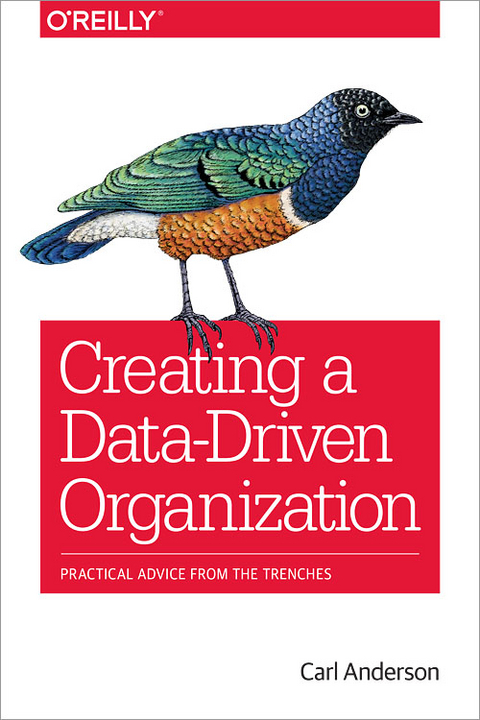
Creating a Data-Driven Organization
O'Reilly Media (Verlag)
978-1-4919-1691-9 (ISBN)
It will help you pause and consider, »are we really as data-driven as we could be?«
By gaining valuable advice and insights from data science and analytics leaders of what worked and what didn't, this practical book will stimulate discussion among data scientists and data analysts in companies from small startups to large corporations about what you can do to make use of data.
What do you need to become a data-driven organization?
Far more than having big data or a crack team of unicorn data scientists, it requires establishing an effective, deeply-ingrained data culture. This practical book shows you how true data-drivenness involves processes that require genuine buy-in across your company, from analysts and management to the C-Suite and the board.
Through interviews and examples from data scientists and analytics leaders in a variety of industries, author Carl Anderson explains the analytics value chain you need to adopt when building predictive business models — from data collection and analysis to the insights and leadership that drive concrete actions. You’ll learn what works and what doesn’t, and why creating a data-driven culture throughout your organization is essential.
- Start from the bottom up: learn how to collect the right data the right way
- Hire analysts with the right skills, and organize them into teams
- Examine statistical and visualization tools, and fact-based story-telling methods
-
Collect and analyze data while respecting privacy and ethics
Understand how analysts and their managers can help spur a data-driven culture
Learn the importance of data leadership and C-level positions such as chief data officer and chief analytics officer
Carl Anderson is the Director of Data Science at Warby Parker. His role encompasses heading up data engineering, supporting over 20 analysts, true data science, developing machine learning and recommendation engines, and creating a data-driven organization.
Chapter 1What Do We Mean by Data-Driven?
Data Collection
Data Access
Reporting
Alerting
From Reporting and Alerting to Analysis
Hallmarks of Data-Drivenness
Analytics Maturity
Overview
Chapter 2Data Quality
Facets of Data Quality
Dirty Data
Data Provenance
Data Quality Is a Shared Responsibility
Chapter 3Data Collection
Collect All the Things
Prioritizing Data Sources
Connecting the Dots
Data Collection
Purchasing Data
Data Retention
Chapter 4The Analyst Organization
Types of Analysts
Analytics Is a Team Sport
Skills and Qualities
Just One More Tool
Chapter 5Data Analysis
What Is Analysis?
Types of Analysis
Chapter 6Metric Design
Metric Design
Key Performance Indicators
Chapter 7Storytelling with Data
Storytelling
First Steps
Sell, Sell, Sell!
Data Visualization
Delivery
Summary
Chapter 8A/B Testing
Why A/B Test?
How To: Best Practices in A/B Testing
Other Approaches
Cultural Implications
Chapter 9Decision Making
How Are Decisions Made?
What Makes Decision Making Hard?
Solutions
Conclusion
Chapter 10Data-Driven Culture
Open, Trusting Culture
Broad Data Literacy
Goals-First Culture
Inquisitive, Questioning Culture
Iterative, Learning Culture
Anti-HiPPO Culture
Data Leadership
Chapter 11The Data-Driven C-Suite
Chief Data Officer
Chief Analytics Officer
Conclusion
Chapter 12Privacy, Ethics, and Risk
Respect Privacy
Practice Empathy
Data Quality
Security
Enforcement
Conclusions
Chapter 13Conclusion
Appendix On the Unreasonable Effectiveness of Data: Why Is More Data Better?
Nearest Neighbor Type Problems
Relative Frequency Problems
Estimating Univariate Distribution Problems
Multivariate Problems
Appendix Vision Statement
Value
Activation
| Erscheint lt. Verlag | 8.9.2015 |
|---|---|
| Verlagsort | Sebastopol |
| Sprache | englisch |
| Maße | 153 x 228 mm |
| Gewicht | 446 g |
| Einbandart | kartoniert |
| Themenwelt | Informatik ► Datenbanken ► Data Warehouse / Data Mining |
| Wirtschaft ► Betriebswirtschaft / Management ► Wirtschaftsinformatik | |
| Schlagworte | Business Intelligence • Data-Driven Economy • Datengetriebene Geschäftsmodelle |
| ISBN-10 | 1-4919-1691-5 / 1491916915 |
| ISBN-13 | 978-1-4919-1691-9 / 9781491916919 |
| Zustand | Neuware |
| Haben Sie eine Frage zum Produkt? |
aus dem Bereich


